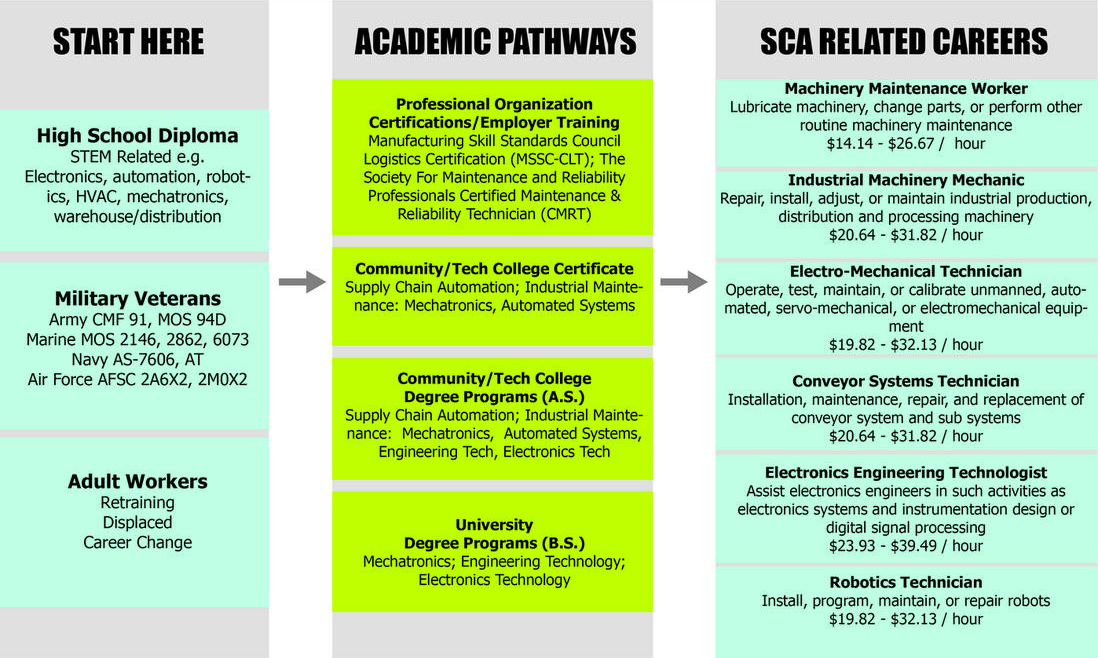Supply Chain Technician Career Information
Learn about careers in the materials handling industry
Our analysis indicates that there will be as many as 770,000 job openings for Supply Chain Technicians (SCTs) in the U.S. between 2015 and 2025. Supply Chain Technicians are in demand across many different industries that are critical to life in our fast-paced, technology-driven world, including retail, manufacturing, automotive, pharmaceutical, and food supply, as well as the Department of Defense.
-
What is Supply Chain Technology?
Supply Chain Technology (SCT) includes the various equipment, machinery, hardware, and software that proves the ability for organizations to manage their supply chains. Technologies included in the supply chain consist of such devices as optical scanners, conveyor systems, Automated Storage and Retrieval Systems (ASRS), Programmable Logic Controllers (PLC), Radio Frequency Identification (RFID), sensors, robotics, data base management systems, inventory control systems, and local area networks. These devices are critical to the supply chain and require individuals with specialized training and education to ensure the success of these technologies. We refer to these individuals as Supply Chain Technicians.
-
What is a Supply Chain Technician?
A Supply Chain Technician is a person who installs, operates, supports, upgrades or maintains the automated material handling equipment and systems that support the supply chain. This type of equipment is found in facilities operated by Amazon, FedEx Ground, UPS, Target, Walmart and many other large corporations. The median wage for these technicians averages $24.00 nationally and advanced technicians with years of experience can earn as much as $84,500 annually. The work is highly-skilled, varied, interesting and in-demand. Are you intrigued? Watch our video to learn a little more.
-
What is meant by Supply Chain Management?
Simply put, the Supply Chain requires managing a network of interconnected businesses involved in the supply of product and services required by the end customers. Supply Chain management spans all movement and storage of raw materials, work-in-progress inventory, and finished goods from the earliest point of product/service conception to the end customer. The activities included in the supply chain comprise everything from product development, sourcing, production, and logistics, as well as the various information and movement systems needed to coordinate these activities.
-
What skills are needed to become a Supply Chain Technician?
The NCSCA team has researched, studied, and analyzed various industrial job types and educational programs and determined that several foundational skills are required of the supply chain technician. Below is a list of some foundational skills:
-
• Electrical and Electronics
• Pneumatics
• Scanners (Optics)
• Programmable Logic Controllers
• Manual Dexterity
• Critical Thinking
• Hydraulics
• Fundamentals of Mathematics
• Fundamentals of Mathematics
• Blueprint (Schematic) Reading
• Material Handling Flow
• Safety Standards
• Problem Solving
• Oral and Written Communication
• Ability to Work in Teams
-
• Electrical and Electronics
-
What education is required?
A combination of professional certifications and technical degree programs can help you get hired as a supply chain technician, with plenty of room to grow in your career. Here are some of the options:
- Professional Organization Certifications
• MSSC Certified Technician-Supply Chain Automation (CT-SCA) • MSSC-CLT: Manufacturing Skill Standards Council Logistics Certification • CMRT: The Society for Maintenance and Reliability Professional Certified Maintenance & Reliability Technician
- Employer (on the job) Training
- Community or Technical College Certificate
• Supply Chain Automation • Industrial Maintenance • Mechatronics • Automated Systems
- Community or Technical College Degree Program (A.S.)
• Supply Chain Automation • Industrial Maintenance • Mechatronics • Automated Systems • Engineering Technology • Electronics Technology
- University Degree Programs (B.S.)
• Mechatronics • Engineering Technology • Electronics Technology
- Professional Organization Certifications
-
What are the jobs?
The U.S. Department of Labor Bureau of Labor Statistics studies all of the jobs in the U.S. and catalogs the work, education and training requirements, advancement opportunities, employment, and 10-year job outlook for hundreds of occupations. All of these are documented on the BLS website and in the online Occupational Outlook Handbook.
Because Supply Chain Technicians work in a variety of industries, the jobs do not fit neatly into a single occupational category. Where needed, the SCA has created occupational profiles to more accurately describe these jobs.
Electro-Mechanical Technician (SCA Profile)
Electro-Mechanical Technician (BLS Occupational Outlook)
Robotics Technician (SCA Profile)
Radio Frequency Identification (RFID) Technician (SCA Profile)
Conveyor Systems Technician (SCA Profile)
Industrial Machinery Mechanic (BLS Occupational Outlook)
Electric & Electronic Repairer of Commerical & Industrial Equipment
Machinery Maintenance Worker (BLS Occupational Outlook)
Electronics Engineering Technologist (BLS Occupational Outlook) -
What is the career progression?

-
Want to learn more about the job market in your state?
The SCA has compiled reports on major job markets in specific states where supply chain automation workers are in particularly high demand. The reports include employment projections, local industry growth and demand analysis, and earning potential.
View now